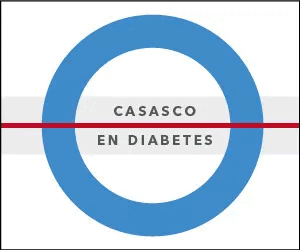Urinary infections associated with the use of isglt-2
DOI:
https://doi.org/10.47196/diab.v53i2.148Keywords:
glycosuric, sglt-2 inhibitors, urinary infection, mycotic infectionAbstract
The most frequent adverse reaction associated with sodium-glucose cotransporter inhibitors therapy is genital mycotic infection, and to a lesser extent urinary infection, this is not dose-dependent. It is more common in women and men before turning 50 years old. The need to interrupt treatment for these infections is rare. It is recommended to avoid the use in patients with a history of recurrent urinary infections or with a recent episode of upper urinary tract infection and special care when indicating it to patients with a history of prostatic hypertrophy since pyelonephritis cases have been described.
References
Arakaki R. Sodium-glucose cotransporter-2 inhibitors and genital and urinary tract infections in type 2 diabetes. Postgrad Med 2016; 128(4): 409-17.
Scheen A. SGLT-2 Inhibitors: benefit/risk balance. Curr Diab Rep 2016; 16 (10) 92.
Rizzi M, Trevisan R. Genitourinary infections in diabetic patients in the new era of diabetes therapy with sodium-glucose cotransporter-2 inhibitors. Nutr Metab Cardiovasc Dis 2016; 26 (11): 963-970.
Dardi I, Kouvatsos T, Jabbour SA. SGLT-2 inhibitors. Biochem Pharmacol 2016; 101: 27-39.
Filippas-Ntekouan S, Filippatos TD, Elisaf MS. SGLT-2 inhibitors: are they safe? Postgrad Med 2018; 130(1): 72-82.
Kalra S, Ghosh S, Aamir AH, et al. Safe and pragmatic use of sodium–glucose co-transporter 2 inhibitors in type 2 diabetes mellitus: South Asian Federation of Endocrine Societies consensus statement. Indian J Endocrinol Metab 2017; 21 (1): 210-230.
Wanner C, Lachin J, Inzucchi S. Empagliflozin and clinical outcomes in patients with type 2 diabetes mellitus, established cardiovascular disease, and chronic kidney disease. Circulation 2018; 137( 2): 119-129.
Downloads
Published
How to Cite
Issue
Section
License

This work is licensed under a Creative Commons Attribution-NonCommercial-NoDerivatives 4.0 International License.
Dirección Nacional de Derecho de Autor, Exp. N° 5.333.129. Instituto Nacional de la Propiedad Industrial, Marca «Revista de la Sociedad Argentina de Diabetes - Asociación Civil» N° de concesión 2.605.405 y N° de disposición 1.404/13.
La Revista de la SAD está licenciada bajo Licencia Creative Commons Atribución – No Comercial – Sin Obra Derivada 4.0 Internacional.
Por otra parte, la Revista SAD permite que los autores mantengan los derechos de autor sin restricciones.







































